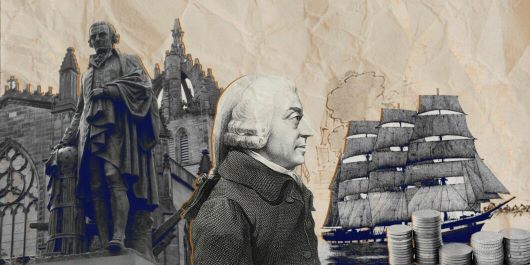Liberty Matters
Law, Market, and Nation-State

My co-respondents evoke a sympathetic and engaging image of Adam Smith (AS), the enlightened moral philosopher, in their responses to Vernon Smith’s (VS’s) provocative short essay. I am “persuaded” by Caroline Breshears’s account of “Smith’s rhetorical ideals,” Brianne Wolf on his “sympathetic system” and Leonidas Montes on “fairness” and the “moral foundations” of his “account of human nature.” The collective portrait rings true to my understanding of AS and the ethos and aspirations of an enlightened, improving age. But the historian wants to know where this “system” (in an era of proliferating systems) came from? VS convinces me that AS asked the same question. AS’s brief comments on murder and capital punishment suggest the answer I develop at much greater length than either he or, I’m guessing, VS, would have thought useful.
As the system-builder was focused on the present state of the British nation and its future prosperity. I’m not sure his “main concern…was improving the condition of the poor” (Montes, my emphasis), but I do agree with Wolf about his strong and inclusive conception of the “nation” or “people,” their “emotional attachment to the law via their sympathy with each other” and their “thick emotional ties.” This was AS’s version of Benedict Anderson’s “imagined community. Getting the history right would be of no great concern to the philosopher—or to the political economist who imagined the “nation” that had emerged with an expanding and increasingly integrated “market” and the “propensities” it mobilized and unleashed. For most purposes, AS could fall back on the stadial theory of historical development, dismissing fanciful notions of an original social contract. AS instead leaned into the future, seeking to enlighten policy-makers about impediments to market freedom and social and economic progress. Yet as his stray comments on crime and punishment in early Britain reveal, AS was a capacious thinker who also recognized the distinctive historical circumstances of contemporary Britain.
How did Britain become a modern, market-based commercial society? My fellow respondents rightly emphasize the importance of culture in sustaining and expanding the ambit of reciprocal recognition and trust in “the social field of communication,” or what Montes calls “a kind of marketplace of persuasion.” Emphasizing speech, they acknowledge the distance between past and present, between “very early times,” when the meaning of words was “ambiguous” and misunderstanding fostered endemic conflict and the modern era, when (quoting AS), “the Introduction of Commerce…brings on the improvement of Prose” (Breshears). Responding to VS’s emphasis on “resentment and punishment,” Montes invokes AS’s “evolutionary perspective,” discovering in his famous formulation of “our [putatively universal] propensity to ‘truck, barter and exchange,’” a teleology or “final cause” in its endpoint, “exchange.” The “moral foundations” of human nature that animate AS’s moral philosophy and VS’s experimental economics are thus realized in modern commercial society. For historians, “foundations” (or “pathways”) come first. For AS’s sympathetic interlocutors, they are immanent in human nature and revealed through history. “Since the eighteenth century,” Montes hopefully concludes, “we have improved towards a much better living together.”
Wolf draws on David Hume as well as AS in developing her “spectatorial theory of property rights.” Emphasizing the “conversational” rather than “contractual” origins of modern society, she questions VS’s thesis that “our natural impulse for revenge” is foundational, suggesting instead that AS used “these passages to check this same impulse in his readers.” Sociable modern people define themselves against their “barbarous” ancestors, becoming civil and enlightened by “interacting with people over time” and arriving “at the best rules for protecting property.” Sympathetically engaging with her enlightened subjects, she joins them in discovering the “necessary foundations of civil society” and a “robust system of property rights” in the domain of “affective ties” and a common culture “beyond the legal enforcement of injury or infringement” (my emphasis). Until they are made “tangible for the average person,” property and exchange are both “ephemeral economic concept[s].” To the skeptical historian these concepts might “seem arbitrary and relativist,” self-evidently historically contingent, impossibly “foundational.” But Wolf and her colleagues give us a valuable, ahistorical perspective on how Smith and his colleagues made sense of their emerging and supposedly improving world. Thinking (and feeling) with their subject, they give us “a different (and inspiring) understanding of liberalism” in its formative moment.
Yet there is also value in thinking historically and following AS’s and VS’s provocative, disquieting commentary on crime, punishment and the formation of modern, sovereign nation-states. For students of AS it is particularly important to keep in mind that the recently United Kingdom was becoming the dominant fiscal-military state of its time, demonstrating an extraordinary capacity to threaten and make war across the frontiers of its far-flung empire, on land and at sea. The efficacy of government at home, in the great British metropolis, may have depended on accommodating the power of public opinion and adhering to the principle of fair play (though we should never underestimate the important of coercive sanctions in preserving the King’s peace), but the very visible hand of state power played a critical role in extending and sustaining empire. The wealth of the nation might promote the prosperity and welfare of the British people, but its primary role was to finance the insatiable demands of making war and keeping the King’s peace—as AS very well knew.
Copyright and Fair Use Statement
“Liberty Matters” is the copyright of Liberty Fund, Inc. This material is put on line to further the educational goals of Liberty Fund, Inc. These essays and responses may be quoted and otherwise used under “fair use” provisions for educational and academic purposes. To reprint these essays in course booklets requires the prior permission of Liberty Fund, Inc. Please contact oll@libertyfund.org if you have any questions.